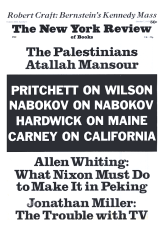“It appears,” says Mr. Rowe in his Introduction, “that Nabokov—partially by means of the mechanisms revealed below—will continue to flutter the pulses of his readers for some time.”
“The mechanisms revealed below” is a pretty phrase, suggesting more than its author intends, but it does not quite apply to me. The purpose of the present review is not to answer a critic but to ask him to remove his belongings. The book consists of three parts. While I have no great quarrel with the first two, entitled “A Touch of Russian” and “N. as Stage Manager,” I must protest vehemently against a number of indecent absurdities contained in the third part, entitled “Sexual Manipulations.”
One may wonder if it was worth Mr. Rowe’s time to exhibit erotic bits picked out of Lolita and Ada—a process rather like looking for allusions to aquatic mammals in Moby Dick. But that is his own choice and concern. What I object to is Mr. Rowe’s manipulating my most innocent words so as to introduce sexual “symbols” into them. The notion of symbol itself has always been abhorrent to me, and I never tire of retelling how I once failed a student—the dupe, alas, of an earlier teacher—for writing that Jane Austen describes leaves as “green” because Fanny is hopeful, and “green” is the color of hope.
The symbolism racket in schools attracts computerized minds but destroys plain intelligence as well as poetical sense. It bleaches the soul. It numbs all capacity to enjoy the fun and enchantment of art. Who the hell cares, as Mr. Rowe wants us to care, that there is, according to his italics, a “man” in the sentence about a homosexual Swede who “had embarrassing manners” (p. 148), and another “man” in “manipulate” (passim)? “Wickedly folded moth” suggests “wick” to Mr. Rowe, and “wick,” as we Freudians know, is the Male Organ. “I” stands for “eye,” and “eye” stands for the Female Organ. Pencil licking is always a reference to you know what. A soccer goal hints at the vulval orifice (which Mr. Rowe evidently sees as square).
I wish to share with him the following secret: in the case of a certain type of writer it often happens that a whole paragraph or sinuous sentence exists as a discrete organism, with its own imagery, its own invocations, its own bloom, and then it is especially precious, and also vulnerable, so that if an outsider, immune to poetry and common sense, injects spurious symbols into it, or actually tampers with its wording (see Mr. Rowe’s crass attempt on his page 113), its magic is replaced by maggots. The various words that Mr. Rowe mistakes for the “symbols” of academic jargon, supposedly planted by an idiotically sly novelist to keep schoolmen busy, are not labels, not pointers, and certainly not the garbage cans of a Viennese tenement, but live fragments of specific description, rudiments of metaphor, and echoes of creative emotion.
The fatal flaw in Mr. Rowe’s treatment of recurrent words, such as “garden” or “water,” is his regarding them as abstractions, and not realizing that the sound of a bath being filled, say, in the world of Laughter in the Dark is as different from the limes rustling in the rain of Speak, Memory as the Garden of Delights in Ada is from the lawns in Lolita. If every “come” and “part” on the pages of my books is supposedly used by me to represent “climax” and “genitals,” one can well imagine the naughty treasures Mr. Rowe might find in any French novel where the prefix “con” occurs so frequently as to make every chapter a veritable compote of female organs. I do not think, however, that his French is sufficient for such feasts; nor is his Russian good enough for his manipulations if he believes that otblesk (confused apparently with otliv) means “low tide” (p. 111) or that the nonexistent “triazh” stands for “tyranny” (p. 41) when actually the word that I used (and that he wrongly transcribed), tirazh, is merely a publisher’s term for “circulation.”
One can excuse a critic for not finding “stillicide” and “ganch” in his abridged dictionary and concluding that I invented those words; one can understand a dull reader of Invitation to a Beheading thinking that the executioner develops a homosexual tenderness for his victim when actually that affectionate look reflects only the lust of a glutton coveting a live chicken; but what I find unpardonable, and indeed unworthy of a scholar, is Mr. Rowe’s twisting my discussion of prosody (as appended to my translation of Eugene Onegin) into a torrent of Freudian drivel, which allows him to construe “metrical length” as an erection and “rhyme” as a sexual climax. No less ludicrous is his examination of Lolita’s tennis and his claim that the tennis balls represent testicles (those of a giant albino, no doubt). Passing on to my reference to chess problems in Speak, Memory Mr. Rowe finds “sexual analogies” in such phrases as “mating devices” and “groping for a pawn in the box”—all of which is as much an insult to chess as to the problemist.
Advertisement
The jacket of Mr. Rowe’s book depicts a butterfly incongruously flying around a candle. Moths, not butterflies, are attracted to light, but the designer’s blunder neatly illustrates the quality of Mr. Rowe’s preposterous and nasty interpretations. And he will be read, he will be quoted, he will be filed in great libraries, next to my arbors and mists!
This Issue
October 7, 1971



